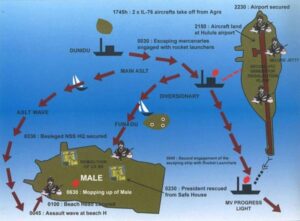Operation Cactus was a military operation conducted by Indian Armed Forces in November 1988. The operation stands as a defining moment in India’s military history and its role as a regional power. The military operation was aimed at restoring order in the Maldives following a coup d’état. It was seen as showcase of India’s capability, prowess, and willingness to act decisively to ensure stability in its immediate neighborhood. India’s assistance to the Maldives during this crisis was a remarkable display of strength and professionalism by the Indian Armed Forces.
In November 1988, a group of Maldivian rebels, with the support of mercenaries, launched a coup against the government of President Maumoon Abdul Gayoom. The situation in the Maldives quickly escalated into a crisis, threatening the stability and security of the island nation. President Gayoom requested assistance from India to quell the rebellion and restore order.
India’s Response and Assistance to the Maldives:
 In response to President Gayoom’s appeal, India swiftly mobilized its military resources to undertake Operation Cactus. The Indian Armed Forces deployed a contingent of troops, including elements of the Indian Army’s Parachute Regiment and the Marine Commandos (MARCOS), to the Maldives. The operation also involved the Indian Air Force (IAF) airlifting troops and equipment to Male, the capital of the Maldives, and positioning Indian Navy ships in the vicinity to provide logistical support and security.
In response to President Gayoom’s appeal, India swiftly mobilized its military resources to undertake Operation Cactus. The Indian Armed Forces deployed a contingent of troops, including elements of the Indian Army’s Parachute Regiment and the Marine Commandos (MARCOS), to the Maldives. The operation also involved the Indian Air Force (IAF) airlifting troops and equipment to Male, the capital of the Maldives, and positioning Indian Navy ships in the vicinity to provide logistical support and security.
Upon arrival in the Maldives, Indian troops coordinated with local authorities to secure key installations, including the airport and the presidential palace. They swiftly neutralized the rebel forces and restored President Gayoom’s government to power. India’s intervention played a crucial role in preventing further violence and instability in the Maldives, thereby safeguarding the democratic process and the well-being of its people.
Operation Cactus showcased the remarkable capability and prowess of the Indian Armed Forces in executing complex and time-sensitive missions. The operation demonstrated India’s ability to deploy and sustain military forces over long distances, conduct joint operations across multiple domains, and effectively project power beyond its borders.
The swift and decisive action taken by the Indian Armed Forces underscored their professionalism, readiness, and commitment to upholding regional stability and security. Despite operating in unfamiliar terrain and facing logistical challenges, Indian troops displayed exemplary courage, determination, and adaptability, earning praise for their performance during the operation.
Operation Cactus represents a momentous point in history for India and its armed forces for several reasons:
Regional Leadership: India’s intervention in the Maldives showcased its willingness to assume a leadership role in the Indian Ocean region and take proactive measures to address security challenges.
Strategic Influence: The success of Operation Cactus enhanced India’s strategic influence and credibility in the region, reinforcing its position as a reliable partner and security provider.
Defense Diplomacy: The operation highlighted the importance of defense diplomacy in India’s foreign policy toolkit, demonstrating the positive impact of military assistance in fostering regional stability and cooperation.
Military Modernization: Operation Cactus underscored the importance of modernizing and strengthening India’s armed forces to meet the evolving security threats and challenges in the region.
Operation Cactus remains a testament to India’s commitment to upholding regional stability and security. The swift and decisive action taken by the Indian Armed Forces in assisting the Maldives during a time of crisis showcased India’s capability, prowess, and readiness to fulfill its responsibilities as a regional power. The operation continues to be remembered as a moment of pride and achievement for India and its armed forces, highlighting their professionalism, courage, and dedication to serving the nation and promoting peace and security in the region.

